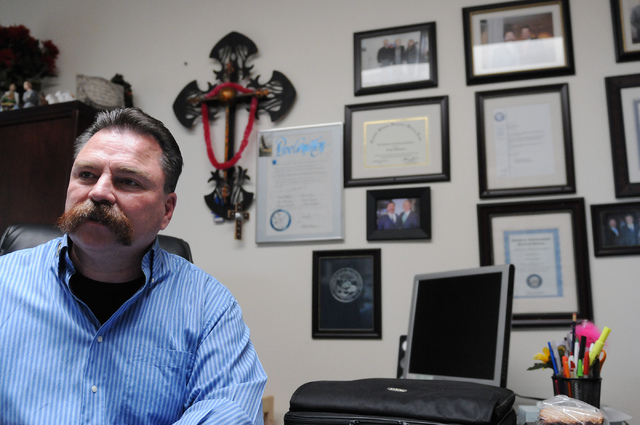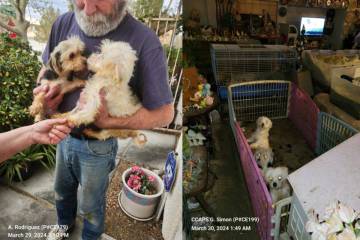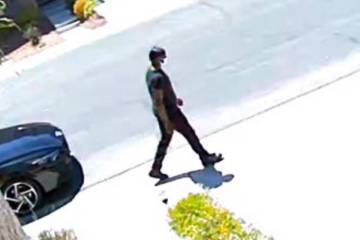Divisions found in effort to stop sex trafficking in Las Vegas
A coalition to fight human trafficking in Nevada is showing signs of strain.
The Silver State has been using collaboration as a weapon against human trafficking in a battle that’s unfolding nationwide. A task force partners with law enforcement, religious leaders, groups that provide services to victims and others in the community looking to abolish the commercial and sexual exploitation of adults and children.
Despite the common mission — stopping human trafficking, a crime Nevada targeted in 2013 with a new law that redefined sex trafficking and set stiff penalties for those convicted of pimping out juveniles — not everyone is getting along.
Troy Martinez, the East Vegas Christian Center pastor behind the documentary “Trafficked No More,” which aired in January on local television, is facing mounting questions from organizations that provide services to victims.
The 30-minute film made a splash when it aired. People held watching parties. A hash tag took hold on Twitter.
But a few months after the awareness campaign launched, some of the Southern Nevada Human Trafficking Task Force’s community partners became worried enough about the man behind the campaign to complain to state Attorney General Catherine Cortez Masto, who appeared in the film.
The task force — a partner in making the film and promoting it — consists of a steering committee that includes Las Vegas police, the Clark County district attorney, the FBI, the U.S. attorney for Nevada, Homeland Security — ICE, the Department of Labor, the Salvation Army and the state attorney general, explained the task force’s director Lou Pascoe, who appeared in the film. The task force also partners with various community groups and people, such as Martinez.
The film “was a big community effort and I feel like we haven’t gotten all the information,” said Daniele Dreitzer, executive director of the Rape Crisis Center, who signed the March 14 petition. Other names on the petition were Esther Rodriguez Brown, founder and executive director of The Embracing Project; Sonia Lucero, director of operations and case manager for Nevada Child Seekers; Alexis Kennedy of the Sojourn Foundation and an associate professor in the UNLV Department of Criminal Justice; and Stacey Cramer, director of the Salvation Army’s SEEDS of Hope program. All the organizations work with victims of human trafficking. Cramer, Brown and Kennedy appeared in the film.
The complaint argues the film’s website is unprofessional and confusing to victims. It also claims the film is being used to raise funds for the pastor’s nonprofit group, 10,000 Kids.
Another concern is that the nonprofit’s efforts to raise money to print school handbooks to educate students about trafficking may also be a means to net funds for 10,000 Kids. The complaint questions whether appropriate tax forms have been filed by 10,000 Kids, although the groups did not ask Martinez directly for the forms.
Martinez recently said the complaint — which he characterized as a letter of concern — was written prematurely. Most of the issues raised have been addressed or resolved, he said.
Martinez provided the Review-Journal with up-to-date tax filings for 10,000 Kids and printed statements associated with the PayPal link that had been on the film’s website.
They showed the documentary had raised $2,597 in donations since it aired at the beginning of the year.
As for the handbooks, Martinez said he’ll be lucky to break even. The handbooks cost $27,355 and so far $8,717 has been raised, he said. The deadline for completing the handbooks is the beginning of the 2014-15 school year.
IN THE MEDIA
Martinez’s comments to media about the film caused concern, said Cramer. She noted that those who signed the complaint felt he made it sound as if he’d raised money with it and that “Trafficked No More” had spurred a lot of victims to come forward. That didn’t reflect what those who signed the complaint were seeing.
Martinez said there isn’t a way to track whether victims who self-report do so as a result of the documentary. When he publicly spoke about an uptick in victims coming forward, he based his statements on national hotline data and media reports. In a recent KVVU-TV, Channel 5, interview, Martinez said there had been a 400 percent increase in trafficking victims coming forward. His assertion grew out of a news report that said the Shade Tree for women and children saw the number of self-reporting trafficking victims increase from one a week to four.
Martinez was executive producer for the documentary, which was sponsored primarily by the Children’s Advocacy Alliance, a Nevada nonprofit focused on issues that affect youth. The alliance gave about $10,000 to the film in addition to in-kind gifts, Martinez said. The Hope Christian Health Center also helped fund the film with about $15,000, Martinez said. Some people involved in the task force donated their time and expertise by giving interviews. The film was directed by Adrian Leon and Aaron Hansel, pastor of the Las Vegas Dream Center, is credited as a producer.
“What I know of Troy Martinez is he is a person of the highest integrity,” said Gard Jameson, chairman and co-founder of the Children’s Advocacy Alliance, who also worked with Martinez through the Interfaith Council of Southern Nevada. “What we have here is a failure to communicate.”
Jameson called the documentary a “home run” and praised Martinez for making it on a “shoestring” budget.
Lou Pascoe, director of the Southern Nevada Human Trafficking Task Force, said the task force shouldn’t dictate how to run a campaign to one of its partners. The task force didn’t commission the documentary, but promoted it and its awareness message.
So who did commission the film?
“Huh, that’s a good question. I don’t want to take all the credit because obviously I would never do it without all the community partners,” Martinez said. “It was literally a community decision.”
“Trafficked No More” grew out of years of meetings on how to raise awareness about the crime, Martinez said. Those meetings included Lt. Karen Hughes, who oversees Metro’s vice section and is on the steering committee of the task force, he added. Hughes also appeared in the film.
Before filming started, Martinez said he presented a game plan for the campaign to the state attorney general.
RAISING CONCERNS
Concerns about Martinez have come up and Pascoe, as task force director, passed them along. The opinion that the film is too sensational has been one of the issues.
In the film, expert interviews are built around a dramatic account from a girl named Anna who falls victim to sex trafficking and is killed.
Martinez said the story was created by combining elements of three real cases: the unsolved murder of his cousin in 1986; the account of mother, Andrea Swanson, who appears in the film and has testified at the Legislature that her daughter fell victim to prostitution via a bad boyfriend; and a woman who appeared in the film and had her identity masked. She was found through 10,000 Kids’ outreach efforts.
“What’s portrayed in that film, compared to reality, is mild,” Martinez said.
Pascoe said arguments that the film was too sensational have been voiced many times.
“What I tried to remind people of in our quarterly collaboration meeting is that everyone has a different perspective of how they will produce something or create a product,” Pascoe said. “The bottom line is this is one story among a plethora of human trafficking stories.”
U.S. Attorney Daniel Bogden said he hadn’t heard any complaints about the film or Martinez.
“First off, the intention of the film was to inform/educate and shed light on a growing local and national problem and the film was not produced as a for-profit film,” Bogden said in an email. “I do not recall anywhere throughout the filming or presentation of this educational film where there was a belief that this would be a film to generate revenue.”
Bogden added he was pleased with the end product. “The film certainly told a very important story and contained an attention-grabbing message about human trafficking that appears to have resonated throughout the state and educated and informed its many viewers about human trafficking.”
In June, the FBI and law enforcement agencies across the nation conducted “Operation Cross Country,” which targeted commercial child sex trafficking and led to the recovery of 168 juveniles and the arrests of 281 pimps. In Las Vegas, seven juveniles were recovered and two pimps were arrested.
The organizations associated with “Trafficked No More” simply want to know that the pastor is being forthright, said one person who signed the complaint letter.
“I worry if he is not legit,” said Brown, of The Embracing Project, which works with youth caught in violent circumstances, such as sex trafficking. “We work very hard to create the credibility that we have. We work very hard to do the work that we do.”
COMING TO THE TABLE
Not getting a timely response from the Nevada attorney general’s office frustrated the complaining parties.
“We work very closely with the Attorney General’s Office and I think the hope was that things were going to resolve themselves, but it was a little frustrating to not have a direct response to our concerns,” said Cramer, of the Salvation Army.
A response to the complaint is now in the works.
“We received the letter and have concerns. The Attorney General in the process of organizing a meeting with those who submitted the letter and Martinez to jointly identify the facts and get to the bottom of the allegations,” said Jennifer Lopez, the attorney general’s public information officer.
As to why a meeting is being scheduled so many months after the complaint, Lopez said, “We’ve been working with the parties to get them to communicate directly, some of which took place at the Solutions Summit on May 29. It appears there needs to be direct one-on-one conversations and the AG is willing to facilitate that meeting.”
Martinez said he will be happy to have everything clarified but he doesn’t understand how people can feel left out of the loop when he regularly gives updates at meetings all the parties attend.
“A topic as sensitive as this — you would assume that there is more collaboration amongst organizations,” said Lucero, of Nevada Child Seekers. “We’re all here for the same reason. We’re all here to help young girls out — and boys — and the whole thing just makes me sad that we can’t just work together to benefit the kids.”
Lucero said children are being helped despite the infighting, but people, such as the pastor, appear to be using the issue as a platform to gain personal prominence when the focus should be on teamwork.
“If I have all these ladies in the room and they are truly there with an open heart, I think it will be productive,” Martinez said of the meeting being arranged by the attorney general’s office. “If they are just going to criticize or put me down or belittle, that’s not going to be fun — but it’s part of being a leader.”
Pascoe said these sorts of disputes won’t deter the task force and are just a regular part of what happens when many people are working together.
“The most important thing about this task force is we give everybody an opportunity to play a role that they can be effective in,” said Hughes of the Las Vegas police.
“Disagreements, differences of opinion, or sometimes just the inability to effectively communicate are sometimes the biggest obstacles.”
Contact Bethany Barnes at bbarnes@reviewjournal.com or 702-477-3861. Find her on Twitter: @betsbarnes.































